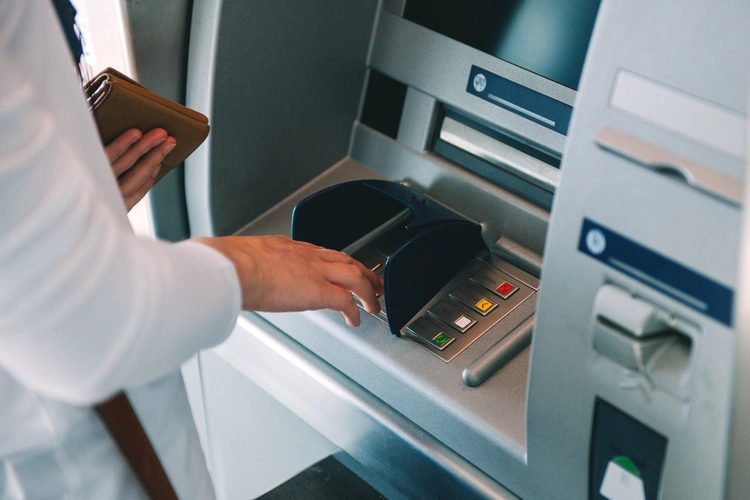What is a cash advance on a credit card?
A cash advance means taking cash out using your credit card. It works a bit like using a debit card at a cash machine.
But there's a big difference. Cash advances cost more. You'll pay higher fees and more interest.
Other things that count as cash advances
You might be surprised at what counts as a cash advance. It's not just taking money from a cash machine. These things can count too:
-
Buying gift vouchers
-
Any gambling (lottery tickets, casino chips, betting)
What about 0% cards?
Even if you have a 0% deal on your credit card, it won't cover cash advances. You'll still pay the normal cash advance rate.
How does a cash advance work?
When you take a cash advance, the money gets added to your credit card bill.
Your card has a cash advance limit. This is part of your overall credit limit, but you can only use a portion of it for cash. Usually, it's 20% to 60% of your total limit.
Where can you get cash?
You can get a cash advance from:
-
Any cash machine (ATM)
-
Your card provider's branch (you'll need ID like a passport)
-
Some shops when you buy something (called cashback)
The important bit: Interest starts straight away. With normal card spending, you get up to 56 days before paying interest. Not with cash advances. The interest starts from day one.
This is why cash advances work best as an emergency option only.
What is a cash advance limit on a credit card?
Your cash advance limit is the most cash you can take out. It's usually much lower than your normal credit limit.
Here's how it works:
Let's say your credit limit is £3,000. Your cash advance limit might be anywhere from £600 to £1,800 (20%-60% of your total limit).
Daily limits matter too. Even if your cash advance limit is £1,500, you can't take it all out at once. Most cash machines and card providers have daily limits. These are usually £300 to £500 per day.
So, you might need to spread your withdrawals over a few days.
Where to find your limit:
-
Check your monthly statement
-
Look in your online banking app
-
Contact your card provider
It's good to check before you try to withdraw. That way you won't get caught out.
Ocean Credit Card
See if it's a YES before you apply
- Up to £1,500 credit limit
- Checking won't affect your credit score
- Get a response in 60 seconds
39.9% APR
Representative (variable)
Intelligent Lending Ltd (credit broker). Capital One is the exclusive lender.

How much does it cost to take cash out on a credit card?
Taking cash out on a credit card costs more than using your card in shops. Here's what you'll pay:
Cash advance fee
Most UK credit cards charge around 3% of what you take out. Or £3. Whichever is more.
Higher interest
The interest rate on cash is higher than on normal spending. Your normal rate might be 15-20%. But cash advances often charge 25-30% or more.
Other fees
Some cash machines charge extra (£2-£3). If you're abroad, there might be foreign fees too (another 2-3%).
Credit card cash withdrawal fees explained
Let's break down the fees with some real examples. This helps you see what you'd actually pay.
The fee structure:
Most providers charge 3% of what you withdraw. But there's a minimum fee of £3.
Whichever is higher, that's what you pay.
Example 1 - Taking out £50:
3% of £50 = £1.50. But the minimum is £3. So you pay £3.
Example 2 - Taking out £200:
3% of £200 = £6. That's more than the £3 minimum. So you pay £6.
The total cost:
Let's say you take out £200 in the UK. Here's what it could cost you:
-
Cash advance fee: £6
-
Cash machine fee (if not your bank): £2
-
Interest (starts immediately): About £0.15 per day at typical rates
-
First day total: Around £8
And the interest keeps adding up every day until you pay it back.
This is why using a debit card is so much better – it's usually free.
Does taking cash out with a credit card affect my credit score?
Taking cash out won't directly lower your credit score. But it can affect it in other ways.
Credit use
Lenders like to see you using less than 30% of your credit limit. If taking cash out pushes you over this, it might lower your score a bit.
An example:
Say you have a £2,000 credit limit. You take out £800 in cash. That's 40% of your limit. This might affect your score.
Multiple cash advances
One cash advance probably won't cause problems. But if you take out cash regularly, it shows on your credit file. Lenders might think you're struggling with money. This could make it harder to get credit later.
Cash advances stay on your credit file for up to six years.
Missing payments
This is the big one. If the cash advance makes it hard to pay your minimum payment, that will definitely hurt your score. Always make at least the minimum payment on time.
Alternatives to credit card cash withdrawals (how to avoid fees)
You can't take cash out on a credit card without fees in the UK. But there are better options that cost much less.
0% money transfer credit card
This is often the best option if you need a decent amount of cash.
Money transfer cards let you move money from the card to your bank account. You get 0% interest for 6 to 21 months (depending on the card). You pay a one-time fee (usually 3%). Then you can take the money from your bank using your debit card for free.
This is much cheaper than a cash advance if you need more money and can pay it back within the 0% period.
Arranged overdraft
If you have a current account, ask your bank about an overdraft. Some banks give you a small overdraft interest-free, often around £250.
Important: Always arrange it first. Never just go overdrawn without asking. The fees for unarranged overdrafts are very high.
Use your debit card
If you have available funds in your current account, it’s usually best to use your debit card. Most cash machines are free and there's no interest.
Personal or credit union loan
For larger amounts, a personal loan or credit union loan might work out cheaper. The interest is usually lower than credit cards. Credit unions are especially helpful if you're struggling to get other credit.
Ask family or friends
If you're comfortable, borrowing from someone you trust can mean no interest or fees at all.
What gets paid off first on your credit card?
When you pay more than the minimum, your card provider pays off the expensive stuff first. This is actually helpful.
The order:
- Cash advances get paid off first (they have the highest interest)
- Normal purchases and balance transfers get paid off next
What this means:
If you have both normal spending and a cash advance on your card, all the cash advance gets cleared before your normal spending reduces.
This helps you because it tackles the most expensive debt first.
The golden rule: Always make at least your minimum payment every month. Missing payments costs you in fees and harms your credit score.
Need help with credit card debt?
If you're thinking about a cash advance because money's tight, it's important to know that free help is available.
Taking out cash when you're already struggling can sometimes make things harder. There are people who can help you find better solutions.
-
StepChange - Free debt advice charity - 0800 138 1111
-
National Debtline - Free helpline - 0808 808 4000
-
MoneyHelper - Government-backed advice - 0800 138 7777
-
Citizens Advice - Free money advice – 0800 144 8848
These organisations can help with budgeting, talking to creditors, and finding debt solutions. They're there to help, not judge.
Disclaimer: We make every effort to ensure content is correct when published. Information on this website doesn't constitute financial advice, and we aren't responsible for the content of any external sites.






